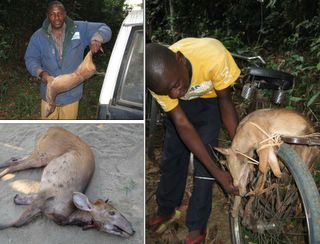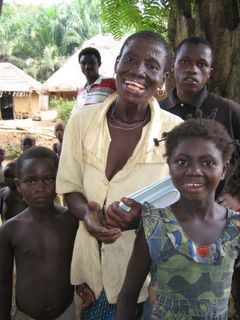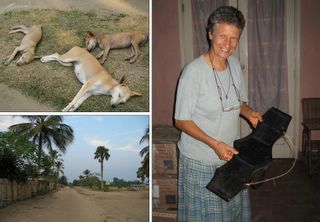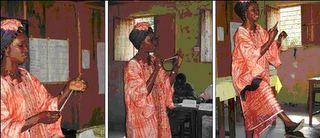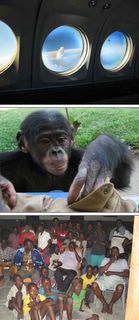The whole participant group is loaded in an open-backed truck. We settle on the metal floor or suspended between the metal bars that form the skeleton of the roof. We negotiate the sandy grounds to get to the hospital for the practical part of the training. Suddenly, the men in front of me duck. Not realizing what is happening, I duck a second too slow and realize that low branches from a nearby tree along the road threatened to decapitate me…much to the amusement of passengers behind me.
We visit and inspect the maternity, the prenatal and postnatal consultation rooms. The prenatal nurse recognizes me and, by way of greeting, tells me I have gained weight. It’s shocking to admit this but I am a good 20 pounds heavier than most of the women in the room who are 8 months pregnant-and I weight about 120 pounds.
In the maternity, a mother is sitting on a cloth on the ground, crying her eyes out. I must look frightened because the women nudge me, saying that labor pains (or labor work as they say in French) are about 100 times more painful than period pains. This woman has a small stature. As a result, for cautionary purposes, she will have to have a caesarian. She is crying warm tears because, once again, she will not be able to give birth naturally. Not one is there to comfort her, not one is there to explain the surgery, no one has prepared her for this eventuality, even though she is a small woman and will have to give birth by caesarian each and every time.


The school kid that I have been waiting on since the 18th finally makes his arrival after a motorcycle ride to Tshudi Loto and then
a three-day bicycle ride to Kole. I pay the bicyclist who brought him over $30 and thank him profusely. The child is happy to be in Kole and the sisters in the convent (who travel often) all recognize him, give him high fives and shake him with delight. He sits down, takes off his shoes, and massage his feet thoroughly. For someone who has never worn closed shoes, the three day ride with these tennis shoes were excruciating. He asks for someone to buy him flip-flops as he has not brought them over in his plastic bags of cloths.
The rest of the day, he eat meat and Chikwangue and hangs out with me. We cannot communicate but he demonstrates is halting new grasp of letters “ffff-fffo-kasu” (focus), “pppee-aa-gesus” (page) etc. I realize that he has not been learning French in his school and the lack of read material has impeded his reading abilities. But it’s obvious he wants to learn and grabs a few magazine eagerly to practice. I promise myself I will buy the school a few easy reading books in French when in France and send them over. I mull over the difficulty of getting them first to Kinshasa (plane), then in my office, and then to Lodja (cargo plane), finishing with Vango which is situated 15 km from isolated Lomela (probably by bike). Before I leave Kole, I make sure to leave enough money to hire a motorcyclist to drive him back the whole way and school fees so he can be in school another year.
My last evening with our partners finishes lavishly as they have invited me to a ceremony at the nearby convent. They have prepared a table full of food, the novices sing and dance my praises (by songs in which they have cleverly substituted my name). I am giving a simple wooden shield, a war ax, and a bright orange table cloth with the words “l’Union fait la Force” (Togetherness is our Strength—a very Mobutu thing to say) embroidered in blue.
I am asked to give an ad-hoc speech, which I do with hesitation, and end my discourse with tears and a clenched throat. I know full-well that, no matter how much I want to come back, the chance being back in this little town as slim to none.


